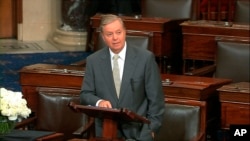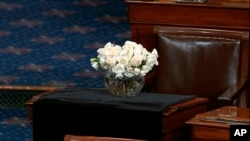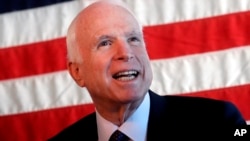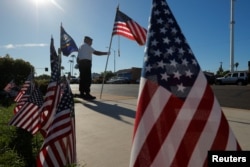John McCain's close friend Lindsey Graham mixed laughter and tears on the Senate floor Tuesday as he remembered "Operation Maverick," which he described as lessons in choosing "what's right at your own expense.''
"He taught me that honor and imperfection are always in competition," Sen. Graham said, reading from a handwritten outline next to McCain's empty desk, now topped with roses. "I do not cry for a perfect man. I cry for a man who had honor and always was willing to admit to his imperfection."
The South Carolina Republican added, "There's a little McCain in all of us."
Graham's tears were the rawest point in a day in which members were still coming to grips with a Senate now permanently without McCain's wily, white-haired presence, something that had been a constant feature of the institution for more than 30 years.
At one point, Sen. Joe Manchin of West Virginia stepped behind the desk, crossed himself, kissed his fingers and touched the black draping. At another, Republican Sens. Susan Collins of Maine, Tim Scott of South Carolina and Manchin formed a tight circle around McCain's spot and admired the roses.
McCain died Saturday at home in Arizona after 13 months battling brain cancer. He had not been back to Washington since December because of his illness, but stayed engaged in policy debates and expressed his disdain for President Donald Trump in their ongoing feud.
But now he was truly gone, his absence confirmed by his empty chair and desk along a much-traversed aisle.
"When you walk by Sen. McCain's desk and you see the black drape and the bowl of white roses, it really underscores the loss," said Sen. Bill Nelson, D-Fla.
As the Senate churned though business Tuesday, McCain's death sat very much at the center of proceedings and at the front of his colleagues' minds. Only four of them know a Senate without McCain, who was elected in 1986 and had become a mentor and moral compass to newcomers. Several defended him against attacks from Trump, who questioned McCain's heroism as a prisoner of war and chafed over McCain's thumbs-down vote that sank the repeal of national health care.
"No one is more worthy of the word `hero' than John McCain," Utah Sen. Orrin Hatch, the most senior Republican in the Senate, said in his own speech.
Graham's eyes and nose were red when he entered the chamber, and he unfurled his sorrow with emotion rarely seen on the televised Senate floor.
"I have been thinking about this. I have been dreading this. And now I'm going to do this" eulogy, Graham said, identifying himself as McCain's "political wingman, code name Little Jerk."
He said his speech would resemble an "after action report" and be titled, "Operation Maverick," for McCain's unconventional path and his rebellious streak.
He said McCain's ultimate lesson is forgiveness and love. He remembered McCain's role as national healer on the night in 2008 when McCain conceded the presidential race to Democrat Barack Obama by saying that Obama was now his president.
Graham also said he hopes people remember one thing "when it comes to the life of John McCain: that it's okay to say, 'I screwed up. I got this wrong,'" — as McCain did after the Keating Five savings and loan scandal, after the presidential race and even after cursing too much.
"Honor is, in my view, doing the right thing at your own expense. And he did that time and time again," Graham said.
Later, Graham said he planned to honor McCain's commitment to immigration issues, vowing to get some form of immigration reform passed "or die trying."
The intractability of that issue vexed McCain, who also was an expert on veterans and the armed forces, Russia and campaign finance reform.
Sen. Chris Coons, D-Del., recalled McCain's expertise and knowledge. The Arizona senator had indeed "peeled the paint off the wall behind me with a fiery stream of profanity-laced invective," Coons recalled, describing the McCain experience of several senators, but he almost always apologized. McCain, Coons said, "was a treasure and a challenge."
McCain's funeral procession will begin Wednesday in Phoenix, where he'll lie in state at the state Capitol. Services will be held Thursday. He arrives back in Washington on Friday to lie in state under the Rotunda for public viewing and a formal ceremony. His casket will then pass the Vietnam Veterans Memorial and be moved to Washington National Cathedral for a service expected to include remarks by former Presidents Barack Obama and President George W. Bush.
People close to the McCain family and President Donald Trump said the family had asked the president to stay away. Trump announced Monday that he would send others to represent his administration.
Speeches by Graham and other senators were effectively the first public farewells of the procession.
Graham told reporters afterward that "what killed me was the black" on McCain's desk.
"I thought I would do much better than I did," he said.







